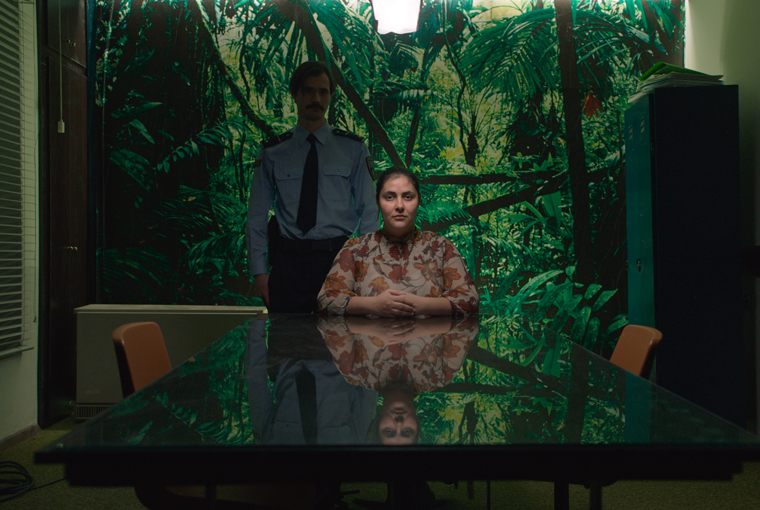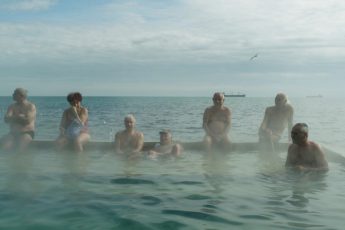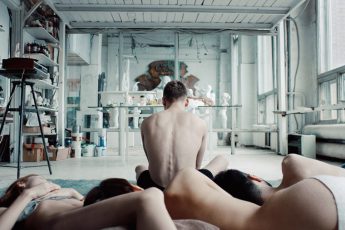The Life of Petrunya
Teona Strugar Mitevska’s God Exists, Her Name Is Petrunya (Gospod postoi, imeto i’ e Petrunija, 2019)
Vol. 93 (March 2019) by Zoe Aiano
Returning from the latest in an endless series of botched job interviews, Petrunya (Zorica Nusheva) chances upon an Epiphany event in which men compete to fish a cross out of the river for good luck. On the spur of the moment, just as the priest hurls the crucifix in the water, Petrunya dives in after it and emerges victorious. The male competitors are outraged, and as the fact of being a woman should automatically preclude her from taking part, she is accused of stealing the coveted cross. A long battle ensues over her right to keep her spoils, as well as over the question of whose jurisdiction this type of question is in the first place.
As a protagonist, Petrunya is something of a refreshing choice. While she initially comes off as sullen and childish, having never worked a day in her 32-year-old life, as the film progresses her hidden depths become apparent, and it becomes clear that the society she lives in plays at least an equal role in limiting her possibilities. In the words of the factory owner who interviews her before the fateful encounter by the river, she can’t sew and he wouldn’t even fuck her. Evidently, she does not fit the prescribed mold for women, so what can she offer? Emulating the men is clearly not an option, as evidenced by the uproar of her daring to transgress the gender boundaries imposed on tradition. She even fails at being suitably Macedonian, as her specialism during her History studies was on the Chinese Revolution and not Alexander the Great. As a result, her academic achievements not only find no outlet, they further mark her as an outsider and a non-functional member of society. Her parents (Violeta Sapkovska and Petar Mirčevski) also offer little support. They presumably mean well and are desperate for her to succeed, but in the case of her mother in particular, this often takes the form of aggression, belittling and even violence.
The Macedonia depicted in the film is a stagnant state, wallowing in a system of entrenched and oppressive hierarchies whose dominance is based primarily on tradition and habit rather than actual mandated power. Priest (Suad Begovski) and police chief (Simeon Moni Damevski) are clearly on intimate terms, and their discussions reveal that the boundaries between their respective realms of authority are very much blurred. In the case of Petrunya, this issue is particularly hard to resolve as she hasn’t technically committed any sin beyond breaking with custom. As such, she remains in custody in a state of limbo – not formally charged yet not permitted to go free.
While the point the film is trying to make is very explicit in this regard, its social critique is quite messy at times. The priest’s position shifts constantly, supporting her one minute and trying to prize the cross out of her hands the next, and this changing stance seems to be bending to fit the narrative rather than reflecting any kind of doubt or nuance. Likewise, the reaction of the police chief is overly exaggerated, as he screams insults at Petrunya in a purple-faced rage.
The representation of mob violence is more convincing, especially in terms of the outrage at a woman stealing the limelight and the snowballing fury directed towards the supposed offender. However, the women themselves leave quite a lot to be desired. While subtly charismatic and persuasively embodying contradictory personality traits, Petrunya herself is nevertheless essentially passive. Her great act of defiance motivated by impulse rather than intention, once she gains possession of the cross, she has little impact on her own fate for the rest of the film, as she waits for the incompetent men to battle it out between them. This may well have been intended as part of the overall critique of the limitations placed on women, but it feels like a missed opportunity in terms of character development nonetheless.
A similar ambiguity also comes into play in relation to her feminist champion, TV news reporter Slavica (Labina Mitevska). Slavica is the one who turns the incident into a media event, framing it as an act of rebellion against patriarchal oppression. However, this act becomes her own personal fight, against the producers who have no interest in the story, against the cameraman who refuses to support her and against her ex-husband, whose non-cooperativeness jeopardizes her ability to stay on the scene. Yet she remains unconvincing as a character, and never really seems to be proved right about her instincts to follow the story. At best, she comes off as dogged and determined, but at worst she seems quixotic and possibly even incompetent. Again, there may be a hidden agenda lurking in this decision, but her strand of the narrative arc ultimately seems to peter out without any real sense of a conclusion.
As a whole, the film is engaging and watchable, thanks in part to its humor and in part to its consistently beautiful cinematography. There are also numerous memorable images that momentarily raise it up above a simple comedy of errors, such as the scene in which Petrunya is sprawled out naked with the cross resting on her breasts. Ultimately, however, it never really capitalizes on its strengths and fails to make much of a point.




Leave a Comment